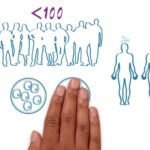According to a new USC study, minority populations in the United States with multiple sclerosis and other autoimmune diseases have poorer outcomes due to modifiable social conditions.
The social determinants of health (SDOH) – factors such as where people are born, grow up, live, work, and age – are unequally distributed, leaving many people of colour with fewer resources to ensure their own well-being.
“Access to neurological specialists and diagnostic tools are limited for Blacks and Latinos with MS or other autoimmune diseases,” said lead researcher Lilyana Amezcua, MD, an associate professor of clinical neurology at USC’s Keck School of Medicine, programme director of the Multiple Sclerosis Fellowship, and director of the Keck Huntington Beach Multiple Sclerosis Infusion Program.
“Our study shows that, before we look at biological factors as the cause of the disparities in health outcomes that we see, we should first assess the role of SDOH and how we might modify them to make a difference.

”The study was recently published in the journal JAMA Neurology.Surveying the terrainResearchers conducted a narrative review of medical literature from three major bibliographic databases of life sciences and biomedical information to investigate the role of SDOH, focusing on studies published between January 2014 and March 2021.
They combed through thousands of journals for terms related to race, ethnicity, disparity, and inequity in the context of autoimmune diseases such as multiple sclerosis (MS) and neuromyelitis optica spectrum disorder (NMOSD). What they discovered was eye-opening – and what they didn’t discover was just as telling.“Normally, one would expect much more data to be available for a survey like this, but racial and ethnic populations, particularly those with MS, are underrepresented. Previously, only about 1% of the literature reflected these minority populations.
“Less than 10% of clinical trials include African Americans or Latinos,” Amezcua said. “This is a disservice to these communities because there are over 20 disease-modifying treatments for multiple sclerosis.
”Autoimmune disease health disparities and inequitiesDespite the scarcity of studies involving people of colour, data show that when it comes to MS and NMOSD, Black and Latino Americans – who have traditionally had lower income, education, and health literacy – are more likely to experience health disparities such as greater disease severity and faster disease progression than white Americans.
Black people are also at a higher risk of developing MS and NMOSD, as well as dying from the disease. The review excluded Asian Americans because data for this group was even more limited.
The review also revealed significant disparities in health-care access, which resulted in diagnostic delays and underutilization of services such as outpatient neurological care, case management, technology, equipment, nursing, and modification services.SDOH’s FunctionThe review found that SDOH, such as low income and education, were associated with lower utilisation of health services by people of colour in the case of MS. Unemployment was linked to worse outcomes for Black patients. Another SDOH associated with racial and ethnic health disparities, according to the study, is negative illness perception.
“Our analysis confirms the power of the health belief model – that what you think about your disease will lead you to take action, or not take action, in order to advocate for yourself as a patient,” Amezcua said. “There is a sense of fatalism in many communities of colour about their ability to improve their MS, which only serves to reinforce the disease’s impact on their lives.”Previous USC studies on the perceptions of illness, particularly MS, in the Latino population found differences between Latinos born in the United States and those who emigrated from other countries, according to Amezcua.
Foreign-born Latinos were more aligned with socio-cultural factors that reduced their likelihood of receiving MS treatment.“What we learned from these studies is that education can change this, and that perceptions can be modified with the right intervention that promotes health literacy,” Amezcua says.
urging for changeThe study’s findings emphasise the importance of developing new approaches to counteract the negative impact of SDOH on underrepresented populations.“It emphasises that, when it comes to autoimmune disorders, vulnerable populations suffer from the same inequities that other chronic conditions have highlighted,” said Lourdes Baezconde-Garbanati, a study co-author and associate dean for community initiatives at the Keck School of Medicine.
“In the future, we as researchers must do a better job of incorporating SDOH into our research models, not only to consider how they affect disease in underrepresented populations, but also to develop interventions that go beyond a single disease.”Concerning the ResearchThe study’s other authors, in addition to Amezcua and Baezconde-Garbanati, are Victor Rivera from Baylor College of Medicine, Teresa Corona Vazquez from Mexico’s National Institute of Neurology and Neurosurgery, and Annette Langer-Gould from Kaiser Permanente Southern California.
The Keck School of Medicine is located in Los Angeles, California.USC’s Keck School of Medicine, founded in 1885, is one of the nation’s leading medical institutions, renowned for innovative patient care, scientific discovery, education, and community service. Medical and graduate students collaborate closely with world-class faculty and receive hands-on training in one of the country’s most diverse communities. They take part in cutting-edge research as they prepare to be tomorrow’s health leaders. The Keck School of Medicine is the largest educator of physicians practising in Southern California, with over 900 resident physicians across 50 specialty and subspecialty programmes.
_________
Health | Don’t forget to follow us on Twitter @njtimesofficial. To get the latest updates





